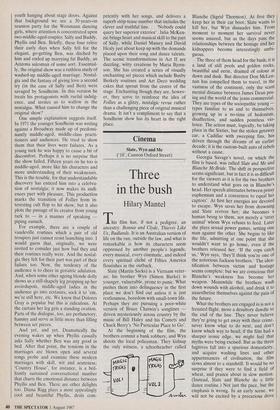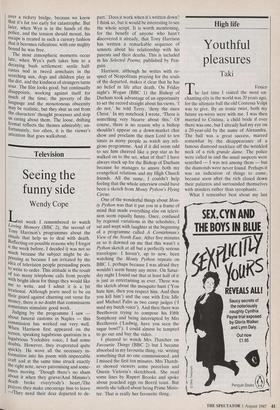Cinema
Three in the bush
Hilary Mantel
This film has, if not a pedigree, an ancestry: Bonnie and Clyde, Thieves Like Us, Badlands. It is an Australian version of life on the run, outside the law, and what is remarkable is how its characters seem oppressed by another people's legends; every musical, every cinematic, and indeed every spiritual cliché of Fifties America flourishes in the outback.
Slate (Martin Sacks) is a Vietnam veter- an; his brother Wyn (Simon Burke) is younger, vulnerable, prone to panic. What pushes them into delinquency in the first place we don't find out unless it is just restlessness, boredom with small-town life. Perhaps they are pursuing a poor-white version of Bruce Chatwin's songlines driven mysteriously across country by the music of Bill Haley and his Comets and Chuck Berry's 'No Particular Place to Go'.
At the beginning of the film, the brothers commit a bank robbery, and Wyn shoots the local policeman. They kidnap the only witness, a schoolteacher called
Blanche (Sigrid Thornton). At first they keep her in their car boot; Slate wants to kill her, but Wyn dissuades him. From moment to moment her survival never seems assured, but as the days pass the relationships between the hostage and her kidnappers become interestingly ambi- guous.
The three of them head for the bush; it is a land of still pools and golden rocks, beautiful and eerie, drained of colour at dawn and dusk. But director Don McLen- nan has compelled them to travel, in the vastness of the continent, only the scant mental distance between James Dean pos- ing and the world of the jeans commercial. They are types of the sociopathic young types familiar to us and to themselves, growing up in a no-time of hedonism, disaffection, and sudden pointless vio- lence. The action must, logically, be taking place in the Sixties, but the stolen getaway car, a Cadillac with sweeping fins, has driven through the dreams of an earlier decade; it is the custom-built auto of rebels without a cause.
Georgia Savage's novel, on which the film is based, was called Slate and Me and Blanche McBride. The shift in perspective seems significant, but in fact it is as difficult for the viewers as it is for the two brothers to understand what goes on in Blanche's head. Her speech alternates between prissy euphemism and a coarseness to equal her captors'. At first her energies are devoted to escape. Wyn saves her from drowning and Slate revives her; she becomes a human being to them, not merely a 'stray animal' whom Wyn refuses to feed. Later she plays sexual power games, setting one man against the other. She begins to like the life, admitting at one p9int that she wouldn't want to go home, even if the brothers released her. 'If the cops catch us,' Wyn says, 'they'll think you're one of the notorious Jackson brothers.' The iden- tification between victim and hostage seems complete; but we are conscious that Blanche's weakness has become her weapon. Meanwhile the brothers wash down wounds with alcohol, and drink it to anaesthetise themselves against the pain of the future.
What the brothers are engaged in is not a frenzied flight, more a desultory dawdle to the end of the line. They never believe they're going to get away with their crime, never know what to do next, and don't know which way to head; if the film had a sharper ironic edge, we might feel that myths were being excised. But as the three fugitives fall into a spurious domesticity, and acquire washing lines and other appurtenances of civilisation, the film slows almost to a standstill. It would be no surprise if they were to find a field of wheat, and prance about in slow motion. (Instead, Slate and Blanche do a little dance routine.) Not just the pace, but the emphasis is wrong. In an early scene, we will not be excited by a precarious drive over a rickety bridge, because we know that it's far too early for catastrophe. But later, when Wyn is in the hands of the police, and the tension should mount, his escape is treated in such a cursory fashion that it becomes ridiculous: with one mighty bound he was free.
The most atmospheric moments occur late, when Wyn's path takes him to a decaying bush settlement: senile half- castes nod in tweed armchairs in the scorching sun, dogs and children play in the dirt, and the kindness of strangers turns sour. The film looks good, but continually disappoints, working against itself for much of the time; the poverty of the language and the monotonous obscenity may be realistic, but they shut us out from the characters' thought processes and stop us caring about them. The loose, drifting format reflects the themes admirably; un- fortunately, too often, it is the viewer's attention that goes walkabout.



















































 Previous page
Previous page